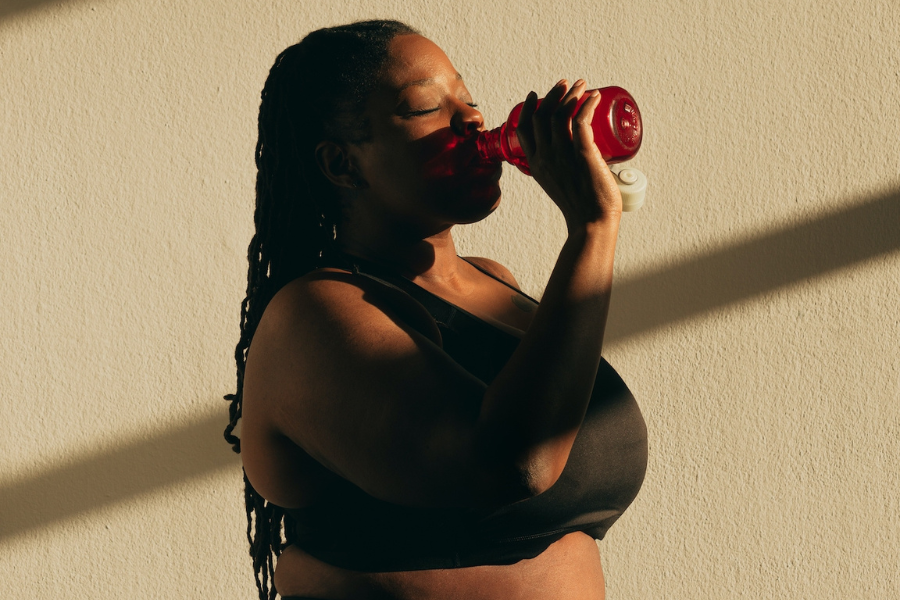Dry Hair, Dry Skin, Dry Everything? The Power of Hydration From the Inside Out

You know how they say water is life? Well, they weren't just trying to sound poetic. In fact, science backs it up big time. Our bodies are basically like that plant you keep forgetting to water--you know, the one in the corner wilting from a lack of hydration? Yea. And a wilting human is not goals. So let's take a look at why water is the MVP of our well-being.
The Science Behind Hydration:
Within the intricate tapestry of the human body, water stands out as a crucial thread, making up an astonishing 60% of our composition. This isn't just a fun fact to share at parties; it underscores the profound role of this vital fluid in myriad bodily functions. From the basics like digestion, absorption, and circulation, to the finer details like producing saliva, shuttling nutrients to where they're needed, and serving as our internal thermostat, water is at the helm. But here's the kicker: even slight dehydration can spell trouble. While severe dehydration is clearly detrimental, its sneakier cousin, mild dehydration, can cause stress and erode our systems slowly over time.
Unraveling the Effects of Dehydration
On the Hair and Scalp:
Water is not just a fundamental ingredient for our bodies; it's also the unsung hero behind those shampoo commercial-worthy locks. Every strand of hair has a deep-rooted connection with hydration. Water maintains the hair's natural shine, suppleness, and strength. But when our bodies face dehydration, our hair sends distress signals - and they aren't pretty. The once lustrous locks can turn brittle, making them more susceptible to breakage from brushing and styling.
Meanwhile, the scalp, feeling left out from the hydration party, might start producing flakes, resembling an unwanted winter wonderland. But the repercussions don't stop there. A consistent lack of hydration can disrupt the hair growth cycle, potentially accelerating hair loss. So the next time you aim for hair goals, remember it’s not just about the right shampoo or conditioner; it’s about quenching its thirst from within.
On the skin:
Our skin thrives much like a garden. When adequately watered, it flourishes, beaming with vitality, elasticity, and that sought-after youthful glow. Hydration ensures our skin remains supple and resilient, creating a natural barrier against daily wear and tear. However, when deprived of its essential moisture, the skin's vibrancy dims, reflecting a more tired, lackluster appearance. Those minor lines suddenly seem to shout louder, and the overall texture feels less plump and more parched.
Beyond aesthetics, dehydrated skin compromises its primary role as a protective barrier, becoming more vulnerable to irritants and environmental stressors. In the realm of skincare, while topical products have their merits, good ol' H2O remains the unsung hero in maintaining a radiant and resilient skin shield.
On the Digestive System:
Imagine a water slide without water; it's tough to navigate and not much fun. Similarly, our digestive tract relies on adequate hydration to function smoothly. Water aids in softening the stool and ensuring it moves seamlessly through the digestive system. When our water intake drops, the system struggles, leading to issues like constipation. Furthermore, dehydration can also result in a reduced production of stomach acid, which can lead to symptoms of acid reflux. Staying hydrated is essential to prevent these uncomfortable and often painful digestive complications.
On the Kidneys:
These bean-shaped organs are our body's natural detox/filtration system, tirelessly working to expel waste products through our urine. For this process to work efficiently, a sufficient influx of water is crucial. Without adequate hydration, the urine becomes concentrated, increasing the risk of kidney stones — painful formations caused by accumulated minerals. Regular water intake ensures that the kidneys function optimally, reducing the risk of these unwanted mineral deposits.
On the Musculoskeletal System:
Every move we make, every step we take, our muscles and joints are hard at work. These tissues have a spongy composition that thrives on hydration. When we're well-hydrated, our muscles are less likely to cramp and can function efficiently during physical activities. Additionally, the joints in our body are cushioned by synovial fluid, which requires water to maintain its viscosity. Dehydration can decrease this cushioning, leading to joint pain or discomfort, especially during movement.
On Brain Function:
The brain, arguably our most crucial organ, is especially sensitive to changes in our body's water levels. Even mild dehydration can quickly impact its function. A dehydrated brain might manifest symptoms like headaches, a direct result of the brain temporarily contracting and pulling away from the skull. Moreover, mood swings, fatigue, and impaired concentration can all be attributed to insufficient hydration. Maintaining water balance is thus not just a matter of physical health but also essential for mental clarity and emotional stability.
On our Blood and Heart:
Dehydration doesn't just whisper its presence; it often screams, manifesting in an array of noticeable physical symptoms. Fatigue and dizziness are the more commonly recognized signs that ring the dehydration alarm bells. When our cells don't receive an adequate water supply, they struggle to produce energy, leading to that all-too-familiar lethargy. Dizziness, on the other hand, stems from the brain receiving less oxygen due to reduced blood volume.
But the plot thickens. As our body's hydration levels dip, the heart has to work overtime, trying to pump a reduced volume of thicker blood throughout the body. This can result in a noticeable increase in heart rate. Compounding this issue, dehydration can cause blood vessels to constrict, leading to a drop in blood pressure. This tandem of increased heart rate and lowered blood pressure makes even mundane daily tasks feel like mountainous challenges, as the body struggles to maintain its normal function amidst its thirst for hydration.
Daily Hydration for Optimum Wellness:
Know Your Needs.
The general "8x8" rule of eight 8-ounce glasses daily is a good baseline. But while this guideline provides a simplified and easy-to-remember starting point, it's crucial to understand that our hydration needs aren't a one-size-fits-all equation. Various factors interplay to determine the precise amount of water our bodies yearn for daily.
Age plays a role; as we mature, our body's water content naturally decreases, potentially altering our hydration requirements. Similarly, weight becomes a determinant; someone with a larger body mass might need more water than their lighter counterpart. But it doesn’t stop at personal metrics. The climate, be it the sweltering heat of summer or the arid winds of winter, can influence the rate at which our body loses water. Additionally, if you're someone who’s routinely engaged in vigorous physical activity or perhaps training for a marathon, your sweat sessions will undoubtedly up the ante on your water intake needs. Recognizing these nuances and tailoring your hydration strategy accordingly can make a significant difference in ensuring optimal wellness.
Tips to Stay Hydrated:
Incorporate Water-Rich Foods.
While gulping down glasses of water is the most direct route to hydration, there's a delicious, often overlooked pathway – our plate! Mother Nature, in her infinite wisdom, has blessed us with an array of succulent foods that brim with water content. Take, for instance, the quintessential summer delight: watermelon. Not only does it offer a refreshing bite on a hot day, but it's also composed of about 90% water. Similarly, the humble cucumber, often the star of salads, is a hydration hero in disguise, providing both crunch and considerable water content. Let's not forget about strawberries, those vibrant red gems that add a burst of flavor and a good dose of hydration to our diet. By incorporating these and other water-rich foods into our daily intake, we can complement our drinking habits and ensure a well-rounded approach to staying hydrated.
Regular Intake.
In our fast-paced world, where daily responsibilities often jostle for our attention, staying consistently hydrated can inadvertently take a backseat. A simple yet effective strategy to keep our hydration goals on track is to intertwine them with our daily routine. Setting hourly reminders, perhaps a gentle ping or a chime on our devices, can act as a timely nudge, prompting us to take that essential sip. For those always on the move, investing in a trusty reusable water bottle can be a game-changer. Not only does it serve as a visible reminder of our hydration goals, but it also encourages eco-friendly practices. By having water within arm's reach, we seamlessly integrate the habit of sipping throughout the day, ensuring our bodies receive a steady stream of hydration.
Monitor Hydration Levels.
Being attuned to our bodies is one of the best ways to maintain optimal health, and hydration is no exception. Subtle signals can often indicate whether we're hitting the mark with our water intake or falling short. For instance, experiencing a persistent dry mouth isn't just a fleeting discomfort; it could very well be our body's SOS for more hydration. Another tell-tale sign can be found in the restroom. Dark, concentrated urine, rather than a light, straw-like hue, is a clear indicator that our body is craving more fluids. Then, there's the all-encompassing feeling of fatigue, which can easily be misconstrued as merely a symptom of a long day. However, it might actually be a result of insufficient hydration. By staying vigilant to these signs and adjusting our intake accordingly, we can ensure that our hydration levels remain balanced and that our body operates at its prime.
Limit Dehydrating Agents:
In the delightful dance of daily beverages, from the morning's energizing coffee to the evening's relaxing cocktail, we often forget a crucial aspect: their potential to dehydrate. Caffeine, that invigorating component in our ritual morning cup, can act as a diuretic, increasing urine production and potentially leading to dehydration if not balanced with adequate water intake. Similarly, while a glass of wine or a spirited cocktail might seem like the perfect way to wind down, alcohol has a sneaky way of robbing our body of its essential hydration. This doesn't mean we need to bid adieu to our favorite drinks, but rather enjoy them with mindfulness. The key is balance. For every caffeinated sip or alcoholic beverage, it's wise to complement it with ample water, ensuring that our hydration levels remain steady and our bodies stay well-nourished amidst the indulgence.
Hydrate Before, During, and After Exercise.
Exercise, while invigorating and beneficial for our overall health, comes with its unique set of demands, one of which is the increased need for hydration. As we lace up our sneakers, hit the track, or find our rhythm in a workout session, our bodies respond with an outpour of sweat. While this is a natural and effective way to regulate body temperature, it's also a clear sign of fluid loss. To counteract this, it's crucial to enter a workout already well-hydrated. Starting with a hydrated base ensures our muscles are primed and ready for action. But the hydration process doesn't halt once the exercise begins. Sipping water during the workout aids in maintaining stamina and preventing muscle cramps. And once we've stretched, cooled down, and patted ourselves on the back for a job well done, the hydration mission continues. Post-exercise, it's essential to replenish the fluids lost, restoring balance and aiding in recovery. In essence, the mantra for fitness enthusiasts should be: hydrate, exercise, hydrate some more.
Utilize Hydration Boosters.
Plain water is often our go-to for hydration, but there are times when we need a bit more. Think of those scorching summer days or post-intense workouts; that's when hydration boosters come into play. Infused waters provide a refreshing blend of fruits and herbs, adding both flavor and potential health benefits. Electrolyte-rich drinks are crucial when we're sweating profusely, as they replace essential salts and minerals. Then, for those always on the move, hydration packs are a game-changer. Just pop one into your water, and you've got an instant hydration. While water remains our primary source, these boosters ensure we are always at our hydration best, regardless of the situation.
From the visible strands of our hair to the hidden corridors of our internal organs, hydration plays an undeniable role in keeping us healthy. Let's not wait for thirst to remind us. Prioritize hydration today for a brighter, healthier tomorrow. Nourish. Treat. Care.



